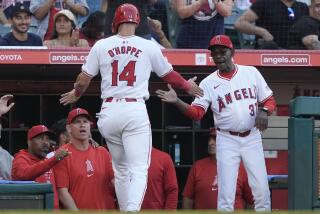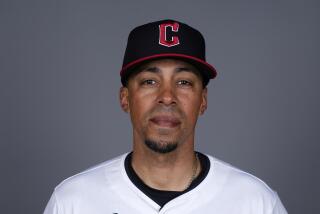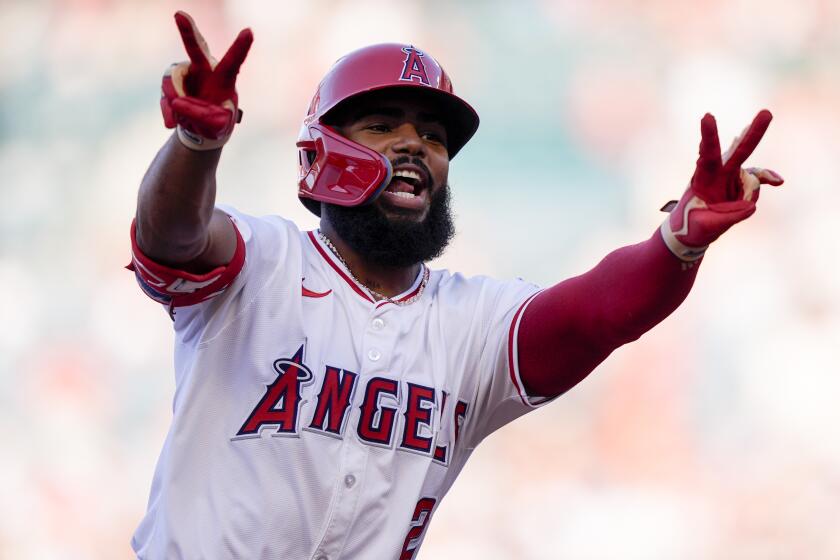Patience Led to This Virtuoso Season
- Share via
As Marcel Lachemann delivered his resignation speech, Tony Tavares stood to one side and scowled, his face turning an almost cartoonish shade of red. Three months after Tavares and the Walt Disney Co. had assumed control of the Angels in 1996, the team was in last place and the manager was quitting, telling the world he could not motivate his players.
Lachemann, at least, could walk out on the mess. Tavares, installed by Disney as club president, had to solve it. Disney had committed $200 million to buy the Angels and renovate their stadium, and the company was demanding a winner on the field by the time construction was finished.
Listening to Tavares that day, you expected Disney to renovate the personnel first. Are the players losers? Dump ‘em. We can’t sell this garbage. The guy who put these players together and called them contenders? Dump him too, and his whole staff.
So what happened? Tavares took a deep breath, listening to General Manager Bill Bavasi defend the organization and the core young players he had signed to long-term contracts. At the end of that week, Tavares signed Bavasi to a three-year contract.
Bavasi fiddled with the roster but left the core mostly intact. And, largely because of that unexpected patience exercised by Disney two years ago, the Angels fielded a winner for this year’s debut of the remodeled Edison Field, formerly Anaheim Stadium. The Angels, shooting for their first division championship since 1986, are in first place in the American League West, one game ahead of the Texas Rangers.
“After ‘96, they could have busted us up and said this wasn’t worth it,” shortstop Gary DiSarcina said. “Obviously, they saw something in us.”
What Tavares said he saw at first was not flattering. After Lachemann concluded his remarks that day, Tavares spewed venom like hot lava.
There was this: “I have seldom been disappointed in Marcel’s effort. I have often been disappointed in the club’s effort.”
This too: “I think we have over-evaluated the talent. That’s what I’m starting to believe. They say this team has potential, but I’ve seen too many teams with potential never achieve.”
And this: “This team has too many players who look like they came from Newport Beach, where their daddies and mommies gave them everything they ever wanted.”
Frankly, Disney might not have been faulted for taking the wrecking ball to the team. The stench lingered from 1995, when the Angels coughed up an 11-game lead in one of the great collapses in baseball history. The last-place finish in 1996 emitted a foul odor too, and Bavasi and his staff realized Disney might try its own hand at baseball operations.
“They very easily could have done that,” said Tim Mead, then the assistant general manager and now vice president for communications. “They could have easily brought in somebody from corporate [headquarters in Burbank] or somebody from the Ducks into the department and had them learn it, and maybe learn it to the point of replacing somebody.”
Despite his inflammatory remarks, Tavares said he never seriously considered firing Bavasi.
“When I think about Bill, what I think about in particular is how well he planned,” Tavares said. “He wasn’t just looking at what was happening right then. He had a plan, and he was able to articulate it clearly and without hesitation.”
Disney endorsed Bavasi’s plan, particularly its fiscal restraint. You can bury a lot of mistakes--and fill a lot of seats--by signing free agents and inflating your payroll to $60 or $70 million, but Disney never would endorse that strategy.
“We knew all along they weren’t going to have a $70-million payroll,” Mead said.
Bavasi said he and his lieutenants--Mead, scouting director Bob Fontaine and minor league directors Ken Forsch and Jeff Parker--were merely following the parting advice of former general manager Whitey Herzog. When he left the Angels in 1994, leaving Bavasi in charge, Herzog reminded everyone the team needed to allow its promising youngsters to play.
So along came DiSarcina, closer Troy Percival, first baseman J.T. Snow and outfielders Garret Anderson, Jim Edmonds and Tim Salmon. Bavasi signed them all to long-term contracts. Even today, none is older than 30.
“Any team would have kept that nucleus,” Salmon said. “The talent is there. But you had to have more of a supporting cast. It was a matter of whether the new owners would give us the freedom to bring in guys like [pitcher] Ken Hill and [infielder] Dave Hollins.”
The Angels needed pitching, so Bavasi traded Snow to the San Francisco Giants for Allen Watson and designated hitter Chili Davis to the Kansas City Royals for Mark Gubicza. Both trades were busts, with Gubicza injured and Watson ineffective, but the Snow trade did free a position for budding superstar Darin Erstad.
Bavasi, hardly discouraged, also imported veterans Hollins, Hill, pitcher Jack McDowell, catcher Jim Leyritz, infielders Luis Alicea and Tony Phillips and designated hitters Cecil Fielder and Eddie Murray. Some moves worked well, some failed miserably, but all those players brought postseason experience lacking in the Angels’ core youngsters.
And the kids grew up too. What Tavares perceived as immaturity in some players in 1996 revealed itself in hindsight as inexperience.
DiSarcina hardly uttered a peep during the 1995 collapse, deferring to veteran infielder Spike Owen. But last week, when the Angels lost Erstad to injury, DiSarcina demanded attention in the dugout, virtually challenging any teammate who dared mumble a discouraging word.
Terry Collins, hired by Bavasi and Tavares as Disney’s first manager, pointed to his experience as a coach with the Pittsburgh Pirates. Barry Bonds and Bobby Bonilla led the Pirates to the first of three consecutive National League East championships in 1990, the fifth major league season for Bonds and Bonilla.
“It takes a little time to build the team and build the confidence,” Collins said.
In that regard, Tavares tips his cap to Collins, just the fiery sort Tavares demanded Bavasi hire to replace the mild-mannered Lachemann and inject life into what he regarded as a mild-mannered clubhouse.
“Bill told me Terry was his No. 1 choice,” Tavares said. “After he told me that, I said, ‘Good, because he was my No. 1 choice too.’ ”
Would the Angels be intimidated in the future? How could they, when Collins felt secure enough in himself to hire Lachemann, his predecessor, as his pitching coach? Collins also retained Hall of Famer Rod Carew as hitting coach and hired two more coaches with burning managerial ambitions, Larry Bowa and Dave Parker.
In a sport where cronies follow each other to jobs like bees to honey, Collins hired none of the coaches who had surrounded him in his previous job with the Houston Astros.
In those bleak days of 1996, DiSarcina said, he often thought of the Cleveland Indians. The Angels followed the Indians’ lead in signing talented young players to long-term contracts, and DiSarcina could only hope the Angels followed the Indians’ lead in another, more memorable way.
“You always wanted to christen the new stadium like Cleveland did, winning pennants and having great teams,” he said.
The Angels might well fly a pennant over Edison Field. DiSarcina, like the other young stars Disney allowed to grow up on the job, would be proud to hoist that flag.
In April, pitcher Chuck Finley appeared at a luncheon, surrounded by fans excited by the arrival of Fielder and McDowell. Wait a second, Finley reminded the fans, this team is five years in the making.
“Sometimes you have to hold your cards,” Finley said. “It’s paid off for us.”
More to Read
Go beyond the scoreboard
Get the latest on L.A.'s teams in the daily Sports Report newsletter.
You may occasionally receive promotional content from the Los Angeles Times.







